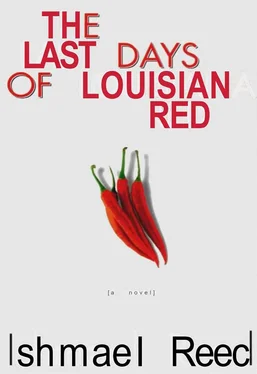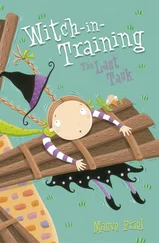Though no one could testify to having seen it or tasted it, Ed’s Gumbo began making waves; though ordinary salesmen hated it, distributors wouldn’t touch it and phony cuisinières gave it a bad name, no one could deny that, however unexplained, there was some kind of operation going on at Ed’s Gumbo premises: cars could be seen arriving and departing; others got theirs through subscription.
Whatever Ed was selling, the people were buying, and rather than put his product on the shelves next to the synthetic wares of a poisonous noxious time, Ed catered to a sophisticated elite. In a town like Berkeley, as in any other American small town, superstitiousness and primitive beliefs were rife and so was their hideous Sister, gossip.
Ghosts too. The computer isn’t to blame; the problems of The Bay Area Rapid Transit are due to the burial grounds of the Costanoan indians it disturbs as it speeds through the East Bay.
Ed was a Piscean, and so he had a whole lot of passion. Too much passion. It was all that passion that made him fall in love with the beautiful Ruby who had been Miss Atlantic City. Maybe it was those cowgirl clothes and boots she wore the night he asked her to dance at Harry’s, the businessman’s lunch place. (Its booths resembled those of a victorian law office; it was dark inside all the time. That’s why exiled New Yorkers drank there: it reminded them of home.)
Ed and Ruby danced all night to Al Green’s singing of The Oakland National Anthem. They danced so they didn’t even hear Percy, owner of the jack-johnson black derby and ’39 Pontiac, announce “Last Call.”
It was all passion and no intellect that made him take her home to his italianate cottage on Milvia and succumb to her clamping squeezing sensual techniques. Before he knew it he was in her vice.
Now, Solid Gumbo Works was becoming so prosperous that when they were married they were able to move into a fine old home in the Berkeley Hills equipped with fireplaces, gaslight medallions, stained-glass windows, and rooms with 12-foot ceilings; in the back was an old stable which he had made into private rooms.
He didn’t want to have children, but she was always miscalculating her “phase of the moon”; she was always talking that way as if influenced by forces in the remote universe, like she was born of a comet or meteorite. How else could you explain Ruby’s strange power over people; she always got her way. She could lie so cleverly that you became convinced that it was the truth even though you knew it was a lie. She would control people and abuse them, but they always forgave her and loved her even more.
Ed was no dummy. Nobody in the Business was a dummy. He was patient; but after sifting the facts and meditating to Doc John he decided to get rid of her. Doc John was the head of the Old Co.’s western field office and stood in an oil portrait on the wall behind Ed’s desk in Ed’s study. He was a tall negro man who, in the painting, was wearing a strange yellow top hat and red jacket and standing next to a handsome auburn-colored horse with a silver-trimmed saddle on its back. In the painting’s background was the old steepled skyline of New Orleans.
Sometimes Ed’s youngest daughter Minnie would peek through his office’s keyhole and see him there in that black silk robe with the jet cross hanging on a chain around his neck. Not the cross of anguish and suffering, the crux simplex , but the oldest cross made of two straight lines which bisect each other at right angles.
There Ed would be kneeling, consulting with Doc John, while white peace candles burned on a long table of brilliant white linen in the center of which was a beautiful silver cup.
His problem wasn’t difficult because Ruby Yellings wanted to leave too. Her husband would never discuss his Business with her. He spent most of his time at the Solid Gumbo Works. And she didn’t like those people who worked with him. That Ms. Better Weather, Ed’s assistant Worker, who sometimes wore a veil.
Ruby liked to spend her time at the Democratic Club. Though she ran for councilwoman and lost, she was building quite a machine. She was always flying from Berkeley to D.C. and partied with the black caucus.
One day Ed came home to find her closets empty and her valuables gone. There was a note on the dresser. She had run off with an up-and-coming Democrat and had gone for good to Washington, D.C., to enter national politics.
Ed was left behind with four children: Wolf, the oldest; Sister, the second; Street; and then the youngest, Minnie.
He wanted his children to believe in Labor, Work and Occupation.
He was successful with Wolf, who at an early age displayed cunning and self-reliance and the ability to finish projects he started. Sister was that way too. An industrious girl who was good with the needle, she sewed the clothes for the family. She was destined to become an internationally known fashion designer, famous for her eclectic prints.
Young Street was a disappointment. He walked about with a pugnacious swagger and was pretty much a bully until someone would give him a licking.
As for Minnie:
During the International Congress of Genetics held in Berkeley the week of August 20, 1973, an important paper was read whose prominence was overshadowed by the sensationalistic headline-grabbing race theories of a Berkeley geneticist. The tenure of this less heralded paper was that psychic as well as physical traits are inherited. Of course, we knew this all along, for didn’t old folks used to speak of how so and so took after his mother or father or was the spitting image of some remote ancestor in “ways” as much as in physical appearance. How many of us have looked in the mirror and seen an unfamiliar pair of eyes staring out of our heads?
So it was with Minnie, the Yellings’ youngest daughter. She was so much like her mother that they could have been twins, and she had her mother’s “ways.”
No! she wasn’t going to wash the dishes; cleaning up your room was for the birds; if he didn’t like what time she came in at night, that was his problem; she went out of her way to come on “field” just like her mother. The only person Minnie would mind was her Nanny, a hefty spread-out woman Ed hired after Ruby went east; what luck, Ed had thought at the time — Nanny had showed up asking for the job before he had placed the “help wanted” ad in the Berkeley Gazette . Nanny had come to them straight from New Orleans. Minnie loved this jolly, robust, happy-go-lucky creature.
Ed never spanked Minnie; he characterized spanking as “Louisiana Red”; he had a cryptic way of expressing himself. As the years went by he became weary of fighting with his youngest daughter and would try to appease her with gifts he’d never give the other children. When she reached her teens she was the only member of her set who owned a Porsche.
As time passed, more and more of Ed’s hours were spent at the Solid Gumbo Works; the booming Business of his enterprise wouldn’t allow him to spend as much time with his children.
The Berkeley Hills where they lived was located in the northern section of the town, called “White town.” Negroes and poor whites lived in “Dark town” or “Bukra town” which was the area located below Grove Street in the “Flats.” The area running through the border segments was referred to as “Japtown.”
A good portion of the “Dark town” and “Bukra town” was located, you guessed it, across the railroad tracks which traveled across University Avenue. Ed liked it in the Berkeley Hills house, secluded by eucalyptus, oak, bay and sycamore trees, even though, once, a cross was burned on his lawn. What luck, Ed had thought at the time. And, faithful to her promises, Nanny was good with the children and especially good with Minnie. They were always in a huddle, whispering.
Читать дальше












